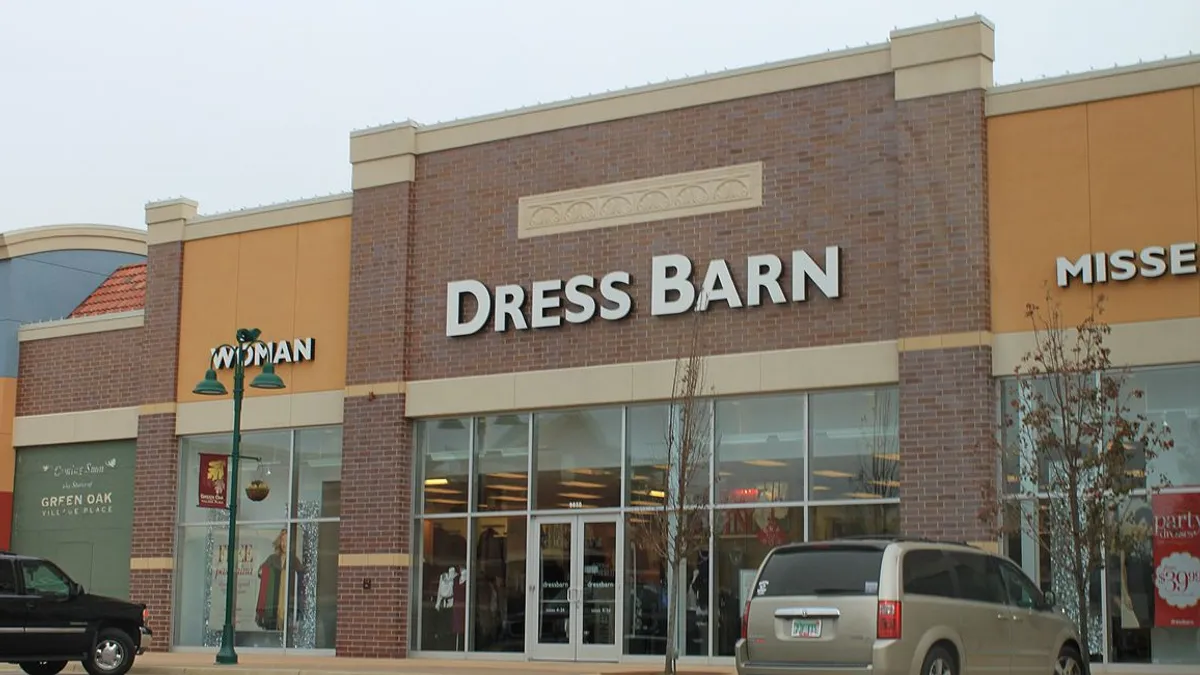UPDATE: October 31, 2019: Ascena-owned Dressbarn on Wednesday announced the final wind-down of all 544 physical stores, with closeout sales starting Friday on all merchandise, including new fall and winter apparel and accessories, at 20% to 40% off original prices, and lasting no later than Dec. 26. Stores will honor gift cards and credits, and the website will honor them until Dec. 31. Store fixtures and furnishing will also be sold, according to a company press release. The retailer also reported the sale of its intellectual property assets, and the transition of its e-commerce business to a subsidiary of Retail Ecommerce Ventures LLC, which will relaunch the site Jan. 1, when previous gift cards, credits or specials will be invalid.
Dive Brief:
-
Ascena Retail Group and its Dressbarn brand on Monday announced plans for Dressbarn "to commence a wind down" of its operations. Troy Taylor, president of financial advisory and investment banking firm Algon Group, has been appointed independent director to The Dress Barn, Inc.'s board, according to a Dressbarn press release.
-
All 650 or so Dressbarn stores and its e-commerce site are open and doing business as usual, with no changes to return, refund or gift card policies. Plans for individual Dressbarn locations, including information about store closing sales, will be shared during the wind down, which is being conducted with the help of A&G Realty Partners, Dressbarn said.
-
The company's 6,800 store employees will be notified as decisions are made about specific closures and provided with transition support, the brand said. Dressbarn intends to pay vendors and suppliers in full in the ordinary course during the process.
Dive Insight:
Sweeping away Dressbarn is the latest in a series of assertive moves spurred by chronic problems at Ascena.
"Dress Barn" was the moniker chosen by founder Roslyn Jaffe in 1962 when she opened her first store for working mothers, a daring premise at a time when women were expected to quit work after having a baby. David Jaffe, her son, earlier this month stepped down as chief executive after leading the company for 27 years. By the time the name was changed to "Ascena" in 2011, it was an apparel conglomerate, having acquired discount brand Maurices in 2005 and tween company Justice (previously Limited Too) in 2009. Plus-size banners Lane Bryant and Catherines, and discount Fashion Bug were added in 2012, then Ann Inc., including Ann Taylor and Loft, in 2015.
"This decision has no impact on the operations of any of ascena's other brands and will strengthen the Company's overall financial performance," Ascena said Monday in a press release. In fact, it's not much of a surprise, according to GlobalData Retail Managing Director Neil Saunders and Ray Hartjen, marketing director of store analytics firm RetailNext.
"The chain has been struggling for years and has lost customers, sales and share. Over recent quarters, those losses have accelerated. Profitability has also been poor," Saunders told Retail Dive in an email. "While Dressbarn stood still, other retailers have stepped in with more exciting propositions. Off-price players, value retailers like H&M, and even department stores like Kohl's have all taken share from Dressbarn."
Its low-price position meant that it needed volume to thrive, he also said. "That's why there appears to be no future for the business, including a lack of potential buyers."
The struggles were not helped much by Ascena itself, which neglected the discount brand and missed even when it tried to improve it, Saunders also said. "Ascena did [make] some lackluster attempts to revive the brand, but these fell flat because it misinterpreted what the customer wanted and alienated its few remaining customer segments," he said. "Even the name now feels old fashioned and dull. There is a particular issue with younger family shoppers, for whom Dressbarn isn't even on the radar."
That all makes it a smart move for Ascena, which still has too many stores across its banners, according to Hartjen. "As an industry, retail tends to see brands slowly die via a thousand paper cuts, but ascena's financial foundation requires it makes rather bold moves, and removing an unprofitable brand from its portfolio is the best place to start," he told Retail Dive in an email. "It couldn't have been an easy decision, as Dressbarn is the fabric the company has been built upon. But, it's a necessary move and one the market is rewarding."
Even so, the failure to unload the brand, in contrast to its recent sale of its other discount brand, Maurices, which went to an affiliate of private equity firm OpCapita LLP for some $300 million, represents "a loss of face," according to Saunders because "Ascena has always sold itself on the basis of being a strong operator in the apparel segment which serves a wide range of demographics, occasions and styles. However, the reality is that Ascena is operationally weak and has done a relatively poor job of managing its individual brands for growth."
As profound as this move is, it hardly means that Ascena's work is done, according to both Saunders and Hartjen. Both said that the conglomerate's plus-size companies, Lane Bryant and Catherines, may need to be incorporated into its other remaining brands in some way, in light of consumers' increasing rejection of specialty plus size players in favor of inclusive ones.
"Even with Dressbarn eventually closed, ascena will still have about 3,000 stores, and I would expect a further consolidation of offerings and an eventual blurring of product lines and product categories, particularly the integration of plus-size fashion into premium fashion," Hartjen said.
















